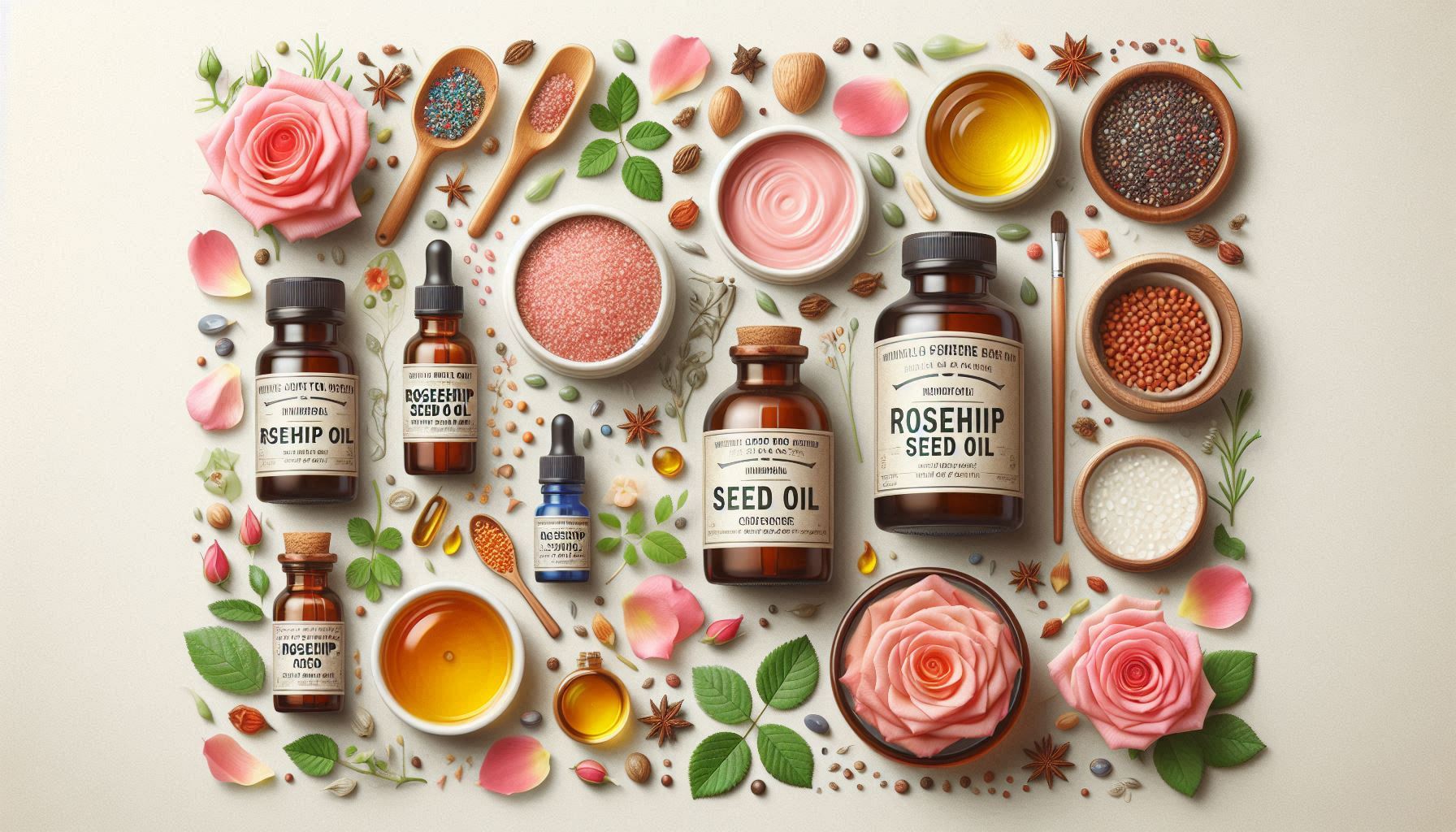
Why do we use Rosehip Seed (Rosa Canina) Oil?
Among the vast world of botanical oils, Rosa Canina (Rosehip) Seed Oil holds a special, almost legendary status. Often called a “dry oil” for its fast-absorbing texture, it is packed with a unique combination of vitamins and fatty acids that make it a powerhouse for skin regeneration, brightening, and overall radiance. As a star active in our ingredient glossary, its benefits for radiance are unparalleled.
What is Rosa Canina (Rosehip) Seed Oil?
Rosa Canina Seed Oil is a pressed oil extracted from the seeds of the wild rose bush, most often grown in the Andes mountains. It is not to be confused with rose essential oil, which is derived from rose petals. Rosehip oil has a subtle, earthy scent, not a floral one.
Its incredible reputation is due to its unique natural composition:
- Essential Fatty Acids: It has a high concentration of linoleic acid (Omega-6) and alpha-linolenic acid (Omega-3), which are vital for maintaining a healthy skin barrier.
- Natural Vitamin A: Rosehip oil contains small amounts of all-trans retinoic acid, a natural retinoid that promotes skin cell turnover. Vitamin A is also known as retinol.
- Antioxidants: It is a source of other powerful antioxidants, including Vitamin C and Vitamin E.
Source:
- National Institutes of Health (PubMed Central): Therapeutic Applications of Rose Hips from Different Rosa Species – This scientific review in the International Journal of Molecular Sciences details the rich composition of Rosehip oil, including its fatty acids, vitamins, and retinoids.
The Good: 3 Key Benefits of Rosehip Seed Oil in Creams
Rosehip Seed Oil is a multi-functional ingredient that helps to brighten, firm, and restore the skin.
1. It Helps Reduce the Appearance of Scars and Fine Lines
This is Rosehip oil’s most famous benefit. Its power comes from the combination of Vitamin A, which accelerates cell turnover, and its essential fatty acids, which are crucial for skin regeneration. This synergy helps to:
- Improve the appearance of post-acne marks and hyperpigmentation.
- Soften the look of fine lines and wrinkles.
- Improve skin’s overall texture and smoothness.
2. It Brightens and Evens Skin Tone
The presence of antioxidants like Vitamin C helps to combat free radicals and inhibit melanin production, the pigment responsible for dark spots. Regular use can lead to a brighter, more even-toned complexion.
3. It Deeply Nourishes and Supports the Skin Barrier
The high content of essential fatty acids (like linoleic acid) makes Rosehip oil an excellent choice for reinforcing the skin’s natural barrier, similar to other high-linoleic oils like Safflower Oil. A strong barrier is better at retaining moisture and defending against environmental irritants, leading to more hydrated and resilient skin.
Source:
- National Institutes of Health (PubMed Central): Anti-Inflammatory and Skin Barrier Repair Effects of Topical Application of Some Plant Oils – This scientific review discusses Rosehip oil’s composition, highlighting its high concentration of linoleic and linolenic acids, which are critical for maintaining a healthy skin barrier and providing anti-inflammatory benefits.
The Bad: Are There Any Considerations?
The very things that make Rosehip oil so powerful also make it delicate.
- It’s Prone to Spoilage: Rosehip oil is rich in delicate polyunsaturated fatty acids and vitamins that are sensitive to light, heat, and air. This means it can go rancid (oxidize) much more quickly than other oils. It’s crucial that it’s stored in a dark, airtight bottle and used within its shelf life (typically 6 months after opening).
- Can Be Too “Active” for Some Situations: While it’s excellent for acne scars, some people find it irritating to apply to active, inflamed acne breakouts due to its high cell turnover properties. Similarly, the natural Vitamin A can be sensitizing for those with extremely reactive skin or rosacea.
- Quality and Extraction Method Are Key: To get the full benefits, the oil must be cold-pressed and unrefined. This gentle extraction method preserves the delicate vitamins and fatty acids.
The Verdict
Rosa Canina (Rosehip) Seed Oil is a top-tier regenerating oil that offers a natural, multi-pronged approach to improving skin tone and texture. Its unique blend of fatty acids and vitamins makes it an exceptional choice for targeting scars, dullness, and signs of aging. While it requires careful handling to preserve its potency, its radiant results are well worth it.
Frequently Asked Questions about Rosehip Oil
Yes. Rosehip Oil contains small amounts of all-trans retinoic acid, which is a naturally occurring form of Vitamin A. This is what gives the oil many of its powerful skin-regenerating and anti-aging properties, though it is gentler than prescription retinoids.
Yes, Rosehip Oil is one of the most popular natural ingredients for improving the appearance of post-acne marks and scars. Its combination of Vitamin A and essential fatty acids helps to promote cell turnover and skin regeneration, which can fade discoloration and improve texture over time.
It can be. Rosehip Oil is a lightweight, “dry” oil that absorbs quickly. Because it is high in linoleic acid, it can be beneficial for balancing oily and acne-prone skin. However, since it is very “active,” it should be patch-tested first.
Find Rosehip Seed Oil in Our Products
(will be updated soon)
